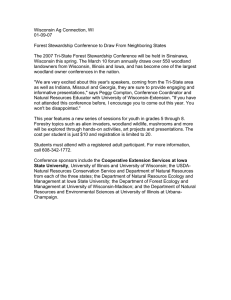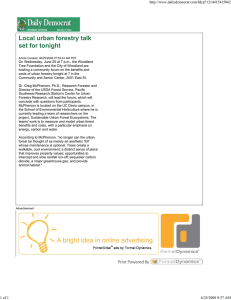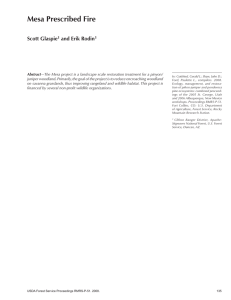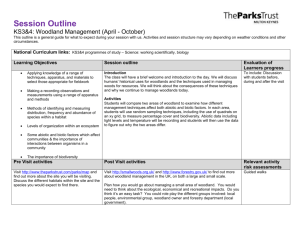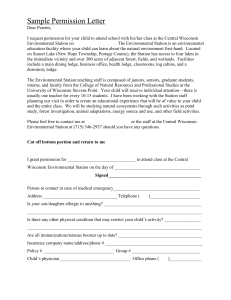Annual Report for 2005 nt oi
advertisement
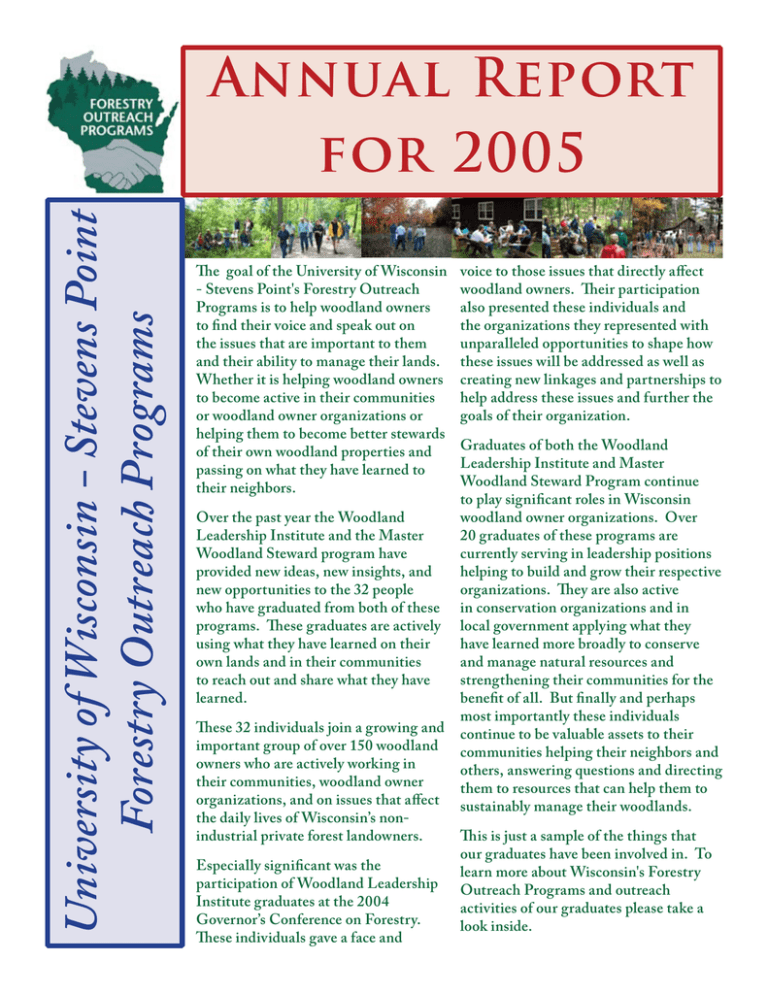
University of Wisconsin - Stevens Point Forestry Outreach Programs Annual Report for 2005 The goal of the University of Wisconsin - Stevens Point's Forestry Outreach Programs is to help woodland owners to find their voice and speak out on the issues that are important to them and their ability to manage their lands. Whether it is helping woodland owners to become active in their communities or woodland owner organizations or helping them to become better stewards of their own woodland properties and passing on what they have learned to their neighbors. Over the past year the Woodland Leadership Institute and the Master Woodland Steward program have provided new ideas, new insights, and new opportunities to the 32 people who have graduated from both of these programs. These graduates are actively using what they have learned on their own lands and in their communities to reach out and share what they have learned. These 32 individuals join a growing and important group of over 150 woodland owners who are actively working in their communities, woodland owner organizations, and on issues that affect the daily lives of Wisconsin’s nonindustrial private forest landowners. Especially significant was the participation of Woodland Leadership Institute graduates at the 2004 Governor’s Conference on Forestry. These individuals gave a face and voice to those issues that directly affect woodland owners. Their participation also presented these individuals and the organizations they represented with unparalleled opportunities to shape how these issues will be addressed as well as creating new linkages and partnerships to help address these issues and further the goals of their organization. Graduates of both the Woodland Leadership Institute and Master Woodland Steward Program continue to play significant roles in Wisconsin woodland owner organizations. Over 20 graduates of these programs are currently serving in leadership positions helping to build and grow their respective organizations. They are also active in conservation organizations and in local government applying what they have learned more broadly to conserve and manage natural resources and strengthening their communities for the benefit of all. But finally and perhaps most importantly these individuals continue to be valuable assets to their communities helping their neighbors and others, answering questions and directing them to resources that can help them to sustainably manage their woodlands. This is just a sample of the things that our graduates have been involved in. To learn more about Wisconsin's Forestry Outreach Programs and outreach activities of our graduates please take a look inside. The format for the 2004 Woodland Leadership Institute was somewhat different from past years. Based on discussions with the Advisory Committee it was recommended that we change the schedule from a series of seminars held through the summer and early fall to fall and winter as a trial. The first seminar for the class of 2004 was held in October and the final seminar was held in February. The reason for this change was to help prepare graduates to take up leadership roles in their respective organizations at the start of 2005. Thirteen people representing Wisconsin Woodland Owners Association, Wisconsin Family Forests, Inc. Living Forest and Prairie Farm Cooperatives as well as individuals representing the consulting forestry and logging professions participated in the class of 2004. This was a diverse group and the richness of the organizations and sectors of the broad field of forestry represented helped participants gain a greater perspective on the issues and topics discussed by presenters. The purpose of the Woodland Leadership Institute is to provide participants with a deeper understanding of the issues facing Wisconsin’s forestlands and forest management philosophies that emphasize the sustainability and stewardship of Wisconsin’s forest resources. The institute accomplishes this through the seminars, readings, observations and interviews of community leaders, and the sharing of ideas and feedback from your classmates. Participants in the Institute received more than 50 hours of classroom instruction and presentations in the field from nearly 30 natural resources and leadership professionals. As one graduated noted “the exposure to forestry and natural resource conservation issues is reinforced with field trips that provide a sense of participation and involvement.” Additionally, between each seminar participants were given readings and homework assignments to help prepare them for the next seminar. These exercises help participants to gain a better understanding of their community and by sharing these experiences allows their classmates to learn about the what is happening in different communities and organizations across the state. Graduates of the Institute are expected to play a significant role in one of Wisconsin’s woodland owner organizations and to reach out to their community through planned projects to help their friends, neighbors, and community better understand sustainable forest management. Each participant develops a set of personal goals based on their skills, vision, and the needs of their community or organization. Woodland Leadership Institute Class of 2004 Some of the projects that graduates are currently pursuing include Chairing the Planning Committee for the Wisconsin Woodland Owners Association’s 2005 Annual Meeting; pursuing a leadership role in one of the Wisconsin Woodland Owners Association’s Chapter; and a project save a local school district through the passage of a referendum to exceed revenue caps on a local school district. As you can see these projects are varied and certainly not all are focused on sustainable forestry. However, each one of these are based on the talents of the individual and the needs of their community and each gives each graduate the opportunity to practice some aspect of what they learned. Page Each year a follow-up survey is sent out to program graduates to learn about their efforts to reach out to their communities and hear about what they have been doing to promote sustainable forest management. Graduates were asked to identify which of the following activities they have been involved with since graduating from the institute. Graduates estimate that through their outreach activities at least 77 woodland owners have contacted forest management professionals, agency staff, or organizations for technical management assistance. 100.0% 90.0% 80.0% 70.0% 60.0% 50.0% 40.0% 30.0% 20.0% 10.0% 0.0% Using ideas learned from the Institute on your land Talking one-on-one Assisting neighbors Showing other Maintaining active Taking the lead to with at least one other with obtaining landowners your involvement with a address forestry issues woodland owner about management assistance management activities local woodland owners important to your the benefits of good association community forest management Graduates were asked to evaluate their knowledge of issues in their local communities and what organizations, agencies, and government are doing to address these issue. 10 9 8 Graduate rate their knowledge and on a scale of 1 to 10, where 10 indicates extensive knowledge of each of the following groups to address issues related to forestry and forest management in your local area / region of the state? 7 6 5 4 3 2 1 Activities of concerned citizens Activities of local woodland owners organizations Activities of Activities of Forest Forest local local government management management conservation boards activities by activities on organizations forestry county, state, and professionals federal forest lands Graduates were asked to report on the types of outreach activities they have been engaged in. Approximately 70 percent of graduates have developed relationships and inf luenced Town Board members. Another 30 percent reported have participated in or having inf luenced their planning commission. 100.0% 150 90.0% 80.0% The graph on the right shows the percent of graduates who have been involved in each of the different outreach activities and the number of accomplishments that they have completed. 70.0% Overall, Woodland Leadership Institute graduates estimate that they contributed over 1,200 hours of service and have spoken to nearly 400 people on a oneto-one basis and made presentations at organized gatherings, workshops, and field days to nearly 1,000 people. 10.0% 120 60.0% 90 50.0% 40.0% 60 30.0% 20.0% 30 0.0% 0 Conducting a Writing articles Discussing Appearing on Talking with local Talking to other Participating in Other activities workshop or for a newspaper, woodland television to community groups Wisconsin local government gathering on your newsletter, stewardship on a discuss woodland or organizations in audiences hearings or board land magazine, etc. radio show stewardship your area regarding meetings woodland stewardship Percent of graduates completing acomplishments Number of accomplishments completed Page Two Classes of the Master Woodland Steward Program were offered during the 2004 fiscal year. The first was offered in the fall of 2004 as an intensive four-day program in the Dodgeville area. This particular class was exciting as it was the outreach project of a previous Program graduate who wanted to bring the Master Woodland Steward Program into her community. The Program was well attended with 19 woodland owners participating represented over 2,300 acres of forest ownership in the southwestern part of the state. The second class began meeting during the spring of 2005 and will be completed later this fall. This class is somewhat different as it is a partnership between UWSP’s Forestry Outreach Programs and the Seno Woodland Education Center which is hosting the Program. Working with the curriculum committee we have adapted the Master Woodland Steward Program into a series of six one-day seminars that will be taught at intervals throughout the summer. We are experimenting with this format to provide for greater opportunities to practice the skills that participants learn in the classroom in the field as well as to take what they learn and use it on their own properties as they establish permanent remeasurement plots to better understand their own woodland property. The purpose of the Master Woodland Steward Program is to offer training for woodland owners who are interested in learning more about sustainable forest management practices and becoming better stewards of their land. Participants in the Master Woodland Steward Program received more than 36 hours of classroom instruction and presentations in the field from over a dozen financial and natural resources professionals. The program continues to be well received and as one participant noted “I guess the only thing that I would change would be to add another day. There is so much to learn and so many great instructors that I felt cheated because we were always cut short on time.” We are also in the process of revising the homework assignments that participants complete between each seminar. The purpose of the homework assignments were to help landowners learn more about the resources available to help them manage their lands. While this is still true participants are now asked to use what they learn in class on their lands to practice these skills and become more familiar with the woodlands that they own. Graduates of the Master Woodland Steward Program are also expected to work in their communities both as role models and through planned projects to help their friends, neighbors, and community better understand sustainable forest management. Some of the projects that graduates are currently pursuing include: Working in my township as a resource for landowners with general forestry questions and provide them with a site to visit to see example of sustainable forest management practices at work. This would be done without directly answering questions or pretending to have a forestry degree; Bringing elementary students out to the farm just Master Woodland Steward Fall Class of 2004 to share; pass along what I have learned to family, friends, neighbors and young adults I work with on projects in our area; Plan to have a field day with the Bad Axe Chapter of WWOA on the topic of specialty forest products. As one graduated noted “I have some new ideas that I will institute on my lands as practical. Your reminder that small projects have a place was beneficial.” Page Master woodland Steward Program participants are asked to evaluate their knowledge of the topics that are covered in each seminar prior to participating in the program and as a part of the overall program evaluation after graduating. Prior to participating in the Program participant’s evaluation of their knowledge in each of the core curriculum areas was highly variable. Some felt they were very knowledgeable and had years of practical hands-on experience in the management of their woodlands while others felt they were novices. 10 9 8 7 6 5 4 3 2 1 0 Aesthetics Forest Ecology Wildlife Silviculture Timber Harvesting Business and Finance The results, shown in the summary graph on Before After the right, showed that each participant felt their level of knowledge in each of the core curriculum areas had increased. Overall graduates were please with the program and the information that they received. 75 percent of participants said the program either exceeded or greatly exceeded their expectations. Graduates of the program felt that they learned a great deal and the evaluation showed that on average graduates’ self - evaluation of their knowledge went up from 1 to 2 points in each of the core curriculums taught. However, a statistical analysis of the data showed that there was no significant difference between participants response prior to participating in the Program as compared to their evaluation of their knowledge after graduation I have sufficient skill to implement some forest and wildlife management activities on my land. 38% Before I am aware of several options available to me for managing my property for wood, wildlife and other benefits. 6% I understand some forest and wildlife management concepts and can explain them to others. 56% After I understand some forest and wildlife management concepts and can explain them to others. 25% I have sufficient skill to implement some forest and wildlife management activities on my land. 75% One of the goals of the Master Woodland Steward Program is to help participants understand and implement the management plans for their property. Participant were asked to evaluate their knowledge of forest and wildlife management techniques and their ability to apply them on their own woodlands prior to and after completing the curriculum as one of the following: • • • • • I have no knowledge of forest or natural resources management. I am aware of several options available to me for managing my property for wood, wildlife and other benefits. I understand some forest and wildlife management concepts and can explain them to others. I have sufficient skill to implement some forest and wildlife management activities on my land. I am very knowledgeable about forest and wildlife management. Prior to participating in the program the majority identified themselves as being able to understand some forest and wildlife management concepts and able to explain them to others. However, after completing the program curriculum 75 percent of graduates now felt that they now had sufficient skill to implement some forest and wildlife management activities on their own lands. Another important goal of this Program is for graduates to pass on what they have learned to their neighbors and other woodland owners or enthusiasts in their community. 75 percent of graduates felt confident that they could refer a woodland owner to the appropriate professional for various types of forest management assistance on their lands. Page The Forestry Outreach Program at UW - Stevens Point is a partnership of the University of Wisconsin Stevens Point, University of Wisconsin Extension, Wisconsin Department of Natural Resources and Wisconsin's woodland owner organizations. The Forestry Outreach Program owes a debt of gratitude to the members of its Advisory and Curriculum Committees for their efforts to assist the Program Director in the development and implementation of these programs and the continuing effort to improve the content of these programs. The following people serve on these Committees. Woodland Leadership Institute Master Woodland Steward Advisory Committee Advisory Committee Al Anderson UW Extension Glen Charlson Wisconsin Woodland Owners Association Shirley Bargander Wisconsin DNR Genny Fannucchi Wisconsin DNR Nancy Bozek Wisconsin Woodland Owner Association Mike Gehrke MWS Graduate Evelyn Charlson WLI Graduate James Heerey MWS Graduate Alan Haney UW Stevens Point Ron Jones Wisconsin DNR Gerry Mich Wisconsin Family Forests, inc. Dan Kretz Kretz Lumber Carl Mueller Wisconsin Woodland Owner Association Geary Searfoss Wisconsin Forest Productivity Council Paul Pingrey Wisconsin DNR Geary Searfoss Wisconsin Forest Productivity Council Curriculum Committee Curriculum Committee Scott Bowe UW - Madison Scott Craven UW - Madison Al Anderson UW Extension Bill Klase UW Extension Paul Pingrey Wisconsin DNR Jamie Nack UW - Madison Mark Rickenbach UW - Madison Paul Pingrey Wisconsin DNR Mark Rickenbach UW - Madison Page Geary Searfoss Wisconsin Forest Productivity Council The Forestry Outreach Programs rely on experts from a variety of disciplines to act as resources and provide presentations and readings for students. Our collaborators in these efforts include: Aldo Leopold Foundation Buddy Huffaker Erin McGraw Rob Nelson Baraboo Range Preservation Association Dave Wernecke Camp 5 Museum Sara Connor Clark Forestry, Inc. Fred Clark Forest Agriculture Enterprises LLC Mark L Shepard Lakeshore Forest Products, Inc. Jim Bednar Stora Enso North America Tim Tollefson US Fish and Wildlife Service Diane Kitchen U.S. Forest Service Walt Ruckheim University of Wisconsin - Extension Al Anderson Dan Hill Bill Klase University of Wisconsin – Madison Scott Bowe Scott Craven Jamie Nack Mark Rickenbach University of Wisconsin - Stevens Point John DuPlissis Stan Gruszynski Lynn Markham Wagner Woods and Wildlife Pete Wagner Wisconsin Academy of Sciences, Arts and Letters Curt Meine Wisconsin Department of Natural Resources Jeff Barkley Paul DeLong Ron Jones Jerry Leiterman Mike Mossman Julie Peltier Paul Pingrey Wisconsin Forest Productivity Council Geary Searfoss Wisconsin Professional Loggers Association Gene Francisco Thoughts from our graduates... How has involvement in one of UWSP’s Forestry Outreach Programs changed the way you manage your woodlands? “I have taken keener interest and become more involved both in management decisions and hands on implementation.” “I am now using my property for educational purposes and I am also keeping up with my plan better than before.” “I use ideas in management gained from the Program and from other Program participants.” What would you say to someone who asks you about participating in the Woodland Leadership Institute? “I would say yes, attend. It doesn’t really matter what kind of background you have if you have an interest in the natural world you will share an experience on a personal level with the other attendees and learn more about interpersonal relationships.” What are some of the things that stand out in your mind about what you have learned and done as a part of this program? “I guess one thing I learned was to keep an open mind when listening to someone even when you don’t agree with them and they really don’t want to listen to your personal views.” What has participating in the Woodland Leadership Institute meant to you? “Has given me a great understanding of the forest industry and the issues we all face ensuring a sustainable woodlands for future generations.” “It was a good experience that allowed me to improve my listening and intervention skills. It was very interesting listening to the different view points and how they were presented.” “A valuable personal experience that teaches not only forestry and conservation but also leadership and organizational skills.” Page For more information about University of Wisconsin Stevens Point’s Forestry Outreach Programs contact… John DuPlissis Forestry Outreach Specialist College of Natural Resources University of Wisconsin – Stevens Point Stevens Point, WI 54481–3897 Phone: 715.346.4128 Fax: 715.346.4038 E - mail: john.duplissis@uwsp.edu Visit our Website at: www.uwsp.edu/cnr/fop Forestry Outreach Programs College of Natural Resources University of Wisconsin – Stevens Point Stevens Point, WI 54481-3897 908757 Non–Profit Org. U.S. POSTAGE PAID Permit No. 19 Stevens Point, WI 54481

